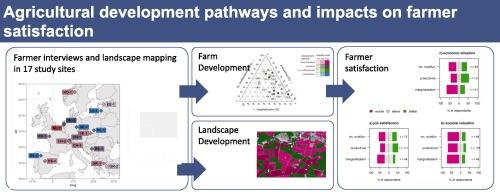Current agricultural practices in Europe are increasingly aggravating societal and environmental safety concerns. This creates social and regulatory pressures on farmers, which can lead to declining material and social status of farmers, farmer discontent, and anti-regulation protests. These tensions are rooted in conflicting value systems for agricultural development, which can range from productivist pathways (i.e. valuing production above all else) to increasing multifunctionality pathways (i.e. valuing agriculture for its contribution to multiple economic, environmental and societal needs). It is largely unknown to what degree individual farms and agricultural landscapes are transitioning towards increasing productivism or multifunctionality in practice. Here, we mapped landscape changes and interviewed farmers (n = 274) to examine the diversity of agricultural development pathways in 17 study sites across Europe over the last 20 years (2000–2020). We also assessed the associations between the development pathways and farmers’ perceptions of socio-economic outcomes, namely job satisfaction, societal valuation, and economic performance. Farm-level development was largely aligned with productivist pathways, while landscape-level changes aligned more closely with an increasing multifunctionality pathway. Farmers on pathways of increasing multifunctionality did not perceive improved outcomes on livelihood indicators as compared to productivist farmers. Furthermore, farms on increasing multifunctionality pathways were concentrated in sites with very high management intensities that face strong pressure from environmental regulations, as well as low-intensity, mountainous sites, where opportunities for intensification are limited. These results suggest that current pathways that increase multifunctionality arise mostly by necessity. Successful agricultural transformation will therefore require policy to create enabling environments that provide socioeconomic benefits for farmers to increase multifunctionality, and a civil society and market conditions that value sustainable agriculture.



